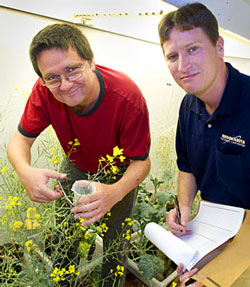New energy department research is aiming to increase the use of plant oils as renewable resource by optimize the production of oil in the seeds.
 Scientists at the U.S. Department of Energy’s (DOE) Brookhaven National Laboratory have developed a computational model for analyzing the metabolic processes in rapeseed plants — particularly those related to the production of oils in their seeds. Their goal is to find ways to optimize the production of plant oils that have widespread potential as renewable resources for fuel and industrial chemicals.
Scientists at the U.S. Department of Energy’s (DOE) Brookhaven National Laboratory have developed a computational model for analyzing the metabolic processes in rapeseed plants — particularly those related to the production of oils in their seeds. Their goal is to find ways to optimize the production of plant oils that have widespread potential as renewable resources for fuel and industrial chemicals.
“To make efficient use of all that plants have to offer in terms of alternative energy, replacing petrochemicals in industrial processes, and even nutrition, it’s essential that we understand their metabolic processes and the factors that influence their composition,” said Brookhaven biologist Jorg Schwender, pictured here on the left with research associate Jordan Hay on the right.
The scientists focused on the plant seeds, where oils are formed and accumulated during development. “This oil represents the most energy-dense form of biologically stored sunlight, and its production is controlled, in part, by the metabolic processes within developing seeds,” Schwender said.
The model they have developed is helping them to determine the effects of variables such as light and nutrients on oil production in plant seeds, and which genes and reactions are necessary for oil formation, and which make oil production most effective.
Read more here.

